



 Second Grade Unit 6 The World Around Us |
||
| Week 1/ Week 2/ Week 3/ Week 4/Week 5 | ||
| Enduring
Understanding Learning about our planet and its natural resources helps us learn how to preserve our environment. Essential Question: How do we learn about nature? |
||
 Students research their chosen habitat by viewing video clips and taking notes on a thinking map. |
||
| Treasures Board Posters | ||
| Week 1: Dig, Wait, Listen, A Desert Toad's Tale | Teacher Resources | Student Resources |
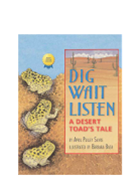 Word Study |
Oral Vocabulary Cards - Week 1 |
Weekly Vocabulary Practice (Student Station) (Student Station) |
|
Enduring Understanding: Good readers make connections among important details to explain the author's purpose for writing a story. Essential Question: Why did the author write the story? Explain. |
This video gives information about the desert habitat. In the video, your class can learn about animals and plants that live in the desert and how they survive. (21 mins.) Note: If the link does not work, login to aacps.discoveryeducation.com This video provides information about the characteristics of the Sonoran Desert, including where it is located, what the climate is like and what plants and animals live there. (2 mins.) **Teacher note: You can stop the video at the 1:45 mark, beyond that, there is no further information on the Sonoran Desert. Note: If the link does not work, login to aacps.discoveryeducation.com |
Letter Generator (Student Interactive for Friendly Letters) Author's Purpose (Pixie activity) |
| Week 2: Splish! Splash! Animal Baths | Teacher Resources | Student Resources |
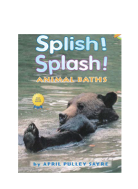 Word Study |
Vocabulary Day 1 Day 2 Day 3 Day 4 Day 5 Oral Vocabulary Cards - Week 2 |
Weekly Vocabulary Practice (Student Station) (Student Station) |
|
Enduring Understanding: Good readers compare and contrast the information in a selection to help them identify and remember the main idea. Essential Question: Make a connection among the details in the story to identify the main idea. How is it different from the topic? |
This video gives information about giraffes living in the wild. The video shows real footage of giraffes living among their herd. (4 mins.) Note: If the link does nto work, login to aacps.discoveryeducation.com |
Compare and Contrast
(Web Quest) |
| Week 3: A Way to Help Planet Earth | Teacher Resources | Student Resources |
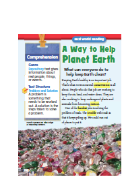 Word Study |
Oral Vocabulary Cards - Week 3 |
Weekly Vocabulary Practice (Student Station) (Student Station) |
|
Enduring Understanding: Good readers identify the problem and solution in stories and the problem and solution in nonfiction texts. Essential Question: What is the problem presented in the selection or in the story, and what steps are taken to solve it? |
This video shows what happens after an oil spill occurs. The video provides information about how an oil spill affects the ocean, the wildlife and the shores. (3 mins.) Note: If the link does not work, login to aacps.discoveryeducation.com This video gives information about the difference between endangered and extinct species. It also shows students some examples of plants and animals that are endangered or extinct and provides reasons for their status. (10 mins.) Note: If the link does not work, login to aacps.discoveryeducation.com This video gives information about water. It will inform students that water is a resource and explain where we get our clean water from, how to keep it clean and all of the uses that we have for water. (12 mins.) Note: If the link does not work, login to aacps.discoveryeducation.com |
Problem and Solution (Student Station) Read a piece of text from Storyline Online. Complete the following story map to show the problem and solution in the story. Note: Teacher will have to select story title for students. Story Map |
| Week 4: Super Storms | Teacher Resources | Student Resources |
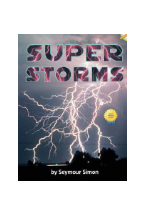 Word Study |
(Vocabulary Oral Vocabulary Cards - Week 4 |
Weekly Vocabulary Practice (Student Station) (Student Station) |
|
Enduring Understanding: Good readers identify the cause-and-effect relationships among ideas in a text to help them see how pieces of information are related. Essential Question: What cause-and-effect relationships can you identify in the text? |
This video has real footage of various types of storms, including snow storms, thunderstorms, tornadoes and hurricanes. The video describes each storm, what they look like and how they develop. (7 mins.) Note: If the link does not work, login to aacps.discoveryeducation.com This video is the animated version of the book, The Magic School Bus: Kicks Up a Storm. Students could read the story first and then watch the animated version to learn more background information about storms. (29 mins.) Note: If the link does not work login to aacps.discoveryeducation.com |
 Hurricane
and Tornado Writing Prompt Hurricane
and Tornado Writing PromptNote to teacher, you must copy to your my contents and assign this assignment. |
| Week 5: Pushing Up the Sky | Teacher Resources | Student Resources |
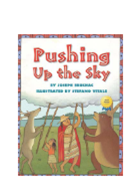 Word Study |
Oral Vocabulary Cards - Week 5 |
Weekly Vocabulary Practice (Student Station) (Student Station) |
|
Enduring Understanding: Good readers identify the problem and solution in stories and the problem and solution in nonfiction texts. Essential Question: What is the problem presented in the selection or in the story, and what steps are taken to solve it? |
Native American Information This video describes Native American tribes that have lived in the United States. The video informs students about their culture, lifestyle, eating habits and even information about totem poles and why they built them. (7 mins.) Note: If the link does not work, login to aacps.discoveryeducation.com |
Story Map (Student Station) Have students read their favorite nonfiction story. Then have them complete the following story map. |
| Theme Connections | |
| Curriculum Links | Resources |
| Teacher Notes | |
| Standards | Resources |
|
Common Core Standard: SL 2 Recound or describe key ideas or details from text read aloud or information presented orally or through other media.
|
Videos: Desert Information Sonoran Desert Characteristics Giraffes What Happens During an Oil Spill Endangered/Extinct Plants and Animals Water and Its Importance Types of Storms: Characteristics and How they Develop Magic Schoo Bus: Kicks Up a Storm Native American Information |
|
Common Core Standard: RI 4 Determine the meaning of
words and phrases in a text relevant to a grade 2 topic or subject
area. Technology Standard: Standard 3: Technology for Learning and Collaboration. Use a variety of technologies for learning and collaboration. |
Weekly Vocabulary Practice |
|
Common Core Standard: W 6 With guidance, use
technology to present findings/conclusions in a variety of formats. Technology Standard: Standard 3: Technology for Learning and Collaboration. Use a variety of technologies for learning and collaboration. |
Letter Generator |
|
Common Core Standard: RI 2 Identify the main topic
of a multiparagraph text as well as the focus of specific paragraphs
within the text.
Technology Standard: Standard 3: Technology for Learning and Collaboration. Use a variety of technologies for learning and collaboration. |
Author's Purpose |
|
Common Core Standard: RI 2 Identify the main topic
of a multiparagraph text as well as the focus of specific paragraphs
within the text.
Technology Standard: Standard 3: Technology for Learning and Collaboration. Use a variety of technologies for learning and collaboration. |
Author's Purpose |
|
Common Core Standard: RI 8 Describe how reasons
support specific points the author makes in a text. W8 Recall information from experiences or gather information from provided sources to answer a question. Technology Standard: Standard 3: Technology for Learning and Collaboration. Use a variety of technologies for learning and collaboration. |
Hurricane and Tornado Writing Prompt |
August 2015